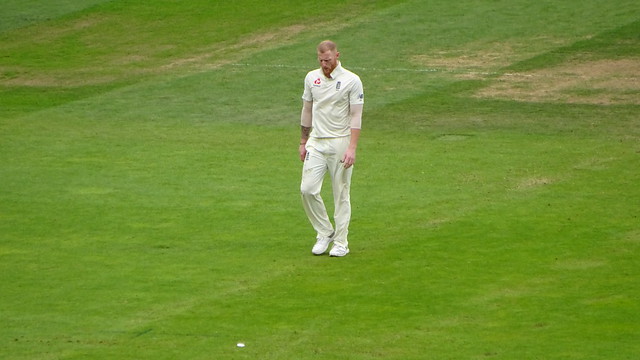Prolific England cricketer Ben Stokes has branded The Sun newspaper as “utterly disgusting” after it ran a front page story about a family tragedy that took place more than three decades ago.
The all-rounder, who played a pivotal role in the country’s Cricket World Cup success in July, posted a statement on Twitter accusing the newspaper of using his name “as an excuse to shatter the privacy” of his family.
The tabloid, which remains the UK’s best selling national paper, ran a front page story concerning Stokes’ family on Tuesday (17 September) which he said contains “serious inaccuracies”.
— Ben Stokes (@benstokes38) September 17, 2019
In his statement, Stokes wrote: “Today The Sun has seen fit to publish extremely painful, sensitive and personal details about events in the private lives of my family going back 31 years.
“It is hard to find words that adequately describe such low and despicable behaviour, disguised as journalism.
“I cannot conceive of anything more immoral, heartless or contemptuous to the feelings and circumstances of my family.”
He added: “The article also contains serious inaccuracies which has compounded the damage caused. We need to take a serious look at how we allow our press to behave.
“Despite the fact that this has now been made public, I do please ask all concerned to respect my family privacy and right to home life.”
The story gives details of events which took place in New Zealand 31 years ago, before he was born, in which his mum’s ex-husband shot killed their two children before taking his own life.
As of 5pm on Tuesday, the hashtags #DontBuyTheSun and #BoycottTheSun were the highest trending terms on Twitter.
But The Sun has defended its coverage in a statement issued following Stokes’ complaint.
“The Sun has the utmost sympathy for Ben Stokes and his mother but it is only right to point out the story was told with the co-operation of a family member who supplied details, provided photographs and posed for pictures,” a spokeswoman said.
“The tragedy is also a matter of public record and was the subject of extensive front page publicity in New Zealand at the time. The Sun has huge admiration for Ben Stokes and we were delighted to celebrate his sporting heroics this summer. He was contacted prior to publication and at no stage did he or his representatives ask us not to publish the story.”
The Right To Privacy

Image Credit: Unsplash.
The right to respect for your private and family life is protected by Article 8 of the Convention on Human Rights.
This protects all citizens – including Stokes and his family – from arbitrary state interference in matters relating to their private and family life, their home and correspondence such as letters, telephone calls and emails.
It also curbs unnecessary media intrusion into private lives. For instance, it bans paparazzi from photographing people in situations where they have a “reasonable expectation of privacy”, even if in a public place.
In 2004, Naomi Campbell successfully sued the Mirror after it published photos of her standing outside Narcotics Anonymous accompanied with the headline “Naomi: I am a drug addict.” The court deemed she had a reasonable expectation of privacy when the photographs were taken, and so publishing them without her consent was a misuse of private information.
In this respect, there is sometimes seen to be a tension between the right to privacy and the right to freedom of expression, which is protected by Article 10 of the Convention. Nevertheless, the right to privacy is qualified.
This means public authorities can take lawful and proportionate action to interfere with this right where it is deemed necessary. This can be to protect national security, public safety, the economy, health or morals, or the rights and freedoms of other people, or to prevent disorder and crime.
Press regulators IPSO and Impress also require journalists to only interfere in a person’s privacy when it can be clearly justified as in the public interest. This means any intrusion must expose serious wrongdoing or protect public health and safety, among other things.
It is unlikely the courts nor any press regulator would deem it in the public interest to republish the details of a family tragedy which took place more than 30 years ago.
What If The Information Is In The Public Domain?
A person’s claim to having their privacy breached may be undermined if the information they wish to keep private is already publicly available. This would mean they are unlikely to have a “reasonable expectation of privacy”. It is up to the courts to determine whether or not the information is in the public domain by carefully scrutinising what has been published.
Dominic Ponsford, editor of website Press Gazette, believes that The Sun’s reporting cannot meet the legal definition of breach of privacy:
I don’t think that reporting on two murders (even 31 years after the event) can reach the legal definition of a breach of privacy. This is public domain information. https://t.co/oAl2J6e07W
— Dominic Ponsford (@Domponsford) September 17, 2019
But each case is different. For instance, in 2005, a judge granted an injunction restraining a newspaper from publishing the addresses of buildings acquired for housing vulnerable adolescents, although it would be known to neighbours and available from the Land Registry.







